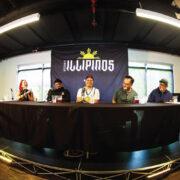FOR most Filipinos, telenovelas have proven more affective to regular households than the evening news.
The recognition and relevance that the audience accords to the narratives from the characters they follow reveal a meaningful social, cultural and even political function that can be attributed to telenovelas.
Analogous to a telenovela, the historic impeachment of Supreme Court Chief Justice Corona invokes a crucial and well-documented cultural and social role. But this time however, the stakes are high and the consequences are real.
Last Monday, The Philippine Senate resumed its regular session for the first time this year as it convened into an impeachment court for the trial of the Chief Justice before live cameras broadcasting to over 90 million Filipinos around the world.
Corona’s battery of top lawyers went head-on with the House’s 10-man prosecution panel aided by 59 private prosecutors who offered their legal services to prove the eight Articles of Impeachment against Corona.
The Chief Justice was accused of shielding former President and now Pampanga Rep. Gloria Macapagal Arroyo from investigation and prosecution for corruption charges by ruling in her favor.
He was also indicted for failing to declare some of his assets, including luxurious properties, and misappropriating judiciary funds.
Judges are expected to interpret the law regardless of personal biases and political leanings. Corona’s impeachment affirms that certain principles essential to judicial independence were maligned in his reign.
Citing strong evidence as the prosecution’s best weapon, President Benigno Aquino III is optimistic of the impending conviction of the beleaguered magistrate.
Aquino insisted that Corona must be held accountable for his offenses, including the violation of the Constitution and questionable decisions in the Supreme Court, to end the perceived culture of impunity of an erring magistrate.
Corona on the other hand, vowed to prove his innocence at the first-ever impeachment trial of a Supreme Court chief justice. He rejected calls for him to resign to spare the country from what was expected to be a grueling contest in the Senate.
“If they want to remove me from my post, they should kill me,” he said when asked what would force him to step down during the first day of his trial.
No matter which side we are on, the outcome of the trial will be difficult to predict and vagaries in the procedures will be inevitable. The seriousness of this challenge affects both parties involved, and every Filipino as it slowly but surely traces impacts on the country’s democracy.
As we watch closely how the embattled magistrate faces charges against him, we should realize legal initiatives and possible changes of laws that will have significant impression on development of the country’s democratic society — no matter what the outcome will be.
The Filipinos’ participation as an audience to Corona’s impeachment process becomes an important way of exercising cultural citizenship — finding recognition in everyday concerns and to some degree, familiarizing one’s self with concerns shared by others.
The Corona debacle portrays many forms of denigration, which continues to taint the country’s political and constitutional process.
As sordid as it is, this should be one drama that all Filipinos should engage themselves in — socially and emotionally. It should not be just a waste of precious time, which is better spent on the real problems of the Philippines.
This is an awakening, for people to observe more and educate themselves on this critical experience in legal history — to identify personalities and ideologies, not only those representing our own districts, but also those shaping our society.
(www.asianjournal.com)
(LA Midweek Jan 18-20, 2012 Sec A pg.6)



